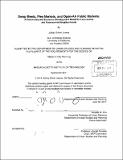Swap meets, flea markets, and open-air public markets : a community and economic development model for low-income and underserved neighborhoods
Author(s)
Juarez, Jeffrey Edwin
DownloadFull printable version (17.90Mb)
Alternative title
Community and economic development model for low-income and underserved neighborhoods
Other Contributors
Massachusetts Institute of Technology. Dept. of Urban Studies and Planning.
Advisor
Annette M. Kim.
Terms of use
Metadata
Show full item recordAbstract
Swap meets, a type of public marketplace, are sites that provide low income and minority communities a place to buy and sell affordable merchandise, as well as create a regular meeting space. In particular, open-air swap meets are places where many social networks form between individuals of different ages, residency status, cultures, and race. From my personal experience of growing up selling with my family in a swap meet in California over eighteen years, I believe that these sites have the potential to serve a greater purpose in their respective communities; one in which they occupy not solely an economic niche, but also incorporate social and cultural programs that serve even the most disadvantaged groups in society. Currently, it appears that only a few swap meets have taken advantage of the potential for creating dynamic places where patrons and participants can partake in activities not solely concerned with buying or selling goods. These "best practice" swap meets understand the value of having a lively environment and the importance of using the physical space innovatively. They open up the venue for performing musicians and non-profit groups to outreach and fundraise, as well as expose the interesting resources and talents that exist within the vending site. These types of activities could benefit other swap meets by increasing awareness as to what makes the community a great place to live and engaging participants in cultural and social resources. In short, a strategy like this improves the overall quality of life for everyone inside the swap meet community and the neighborhood as well.
Description
Thesis (M.C.P.)--Massachusetts Institute of Technology, Dept. of Urban Studies and Planning, 2011. Cataloged from PDF version of thesis. Includes bibliographical references (p. 128-133).
Date issued
2011Department
Massachusetts Institute of Technology. Department of Urban Studies and PlanningPublisher
Massachusetts Institute of Technology
Keywords
Urban Studies and Planning.